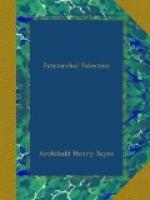The Chronicler, however, has preserved a notice which seems to show that a connection was still kept up between Southern Canaan and the Hebrew settlers in Goshen, even after Jacob’s death, perhaps while he was yet living. We are told that certain of the sons of Ephraim were slain by the men of Gath, whose cattle they had attempted to steal, and that their father, after mourning many days, comforted himself with the birth of other sons (1 Chron. vii. 21-26). The notice, moreover, does not stand alone. Thothmes III., the great conqueror of the eighteenth Egyptian dynasty, states that two of the places captured by him in Palestine were Jacob-el and Joseph-el. It is tempting to see in the two names reminiscences of the Hebrew patriarch and his son. If so, the name of Joseph would have been impressed upon a locality in Canaan more than two centuries before the Exodus. The geographical lists of Thothmes III. and the fragments of early history preserved by the Chronicler would thus support and complete one another. The Egyptian cavalry who accompanied the mummy of Jacob to its resting-place at Machpelah, would not be the only evidence of the authority claimed by Joseph and his master in the land of Canaan; Joseph himself would have left his name there, and his grand-children would have fought against “the men of Gath.”
But these are speculations which may, or may not, be confirmed by archaeological discovery. For the Book of Genesis Canaan disappears from sight with the death of Jacob. Henceforward it is upon Egypt and the nomad settlers in Goshen that the attention of the Pentateuch is fixed, until the time comes when the age of the patriarchs is superseded by that of the legislator, and Moses, the adopted son of the Egyptian princess, leads his people back to Canaan. Joseph had been carried by Midianitish hands out of Palestine into Egypt, there to become the representative of the Pharaoh, and son-in-law of the high-priest of Heliopolis; for Moses, the adopted grandson of the Pharaoh, “learned in all the wisdom of the Egyptians,” it was reserved, after years of trial and preparation in Midian, to bring the descendants of Jacob out of their Egyptian prison-house to the borders of the Promised Land.
CHAPTER V
EGYPTIAN TRAVELLERS IN CANAAN
Palestine has been a land of pilgrims and tourists from the very beginning of its history. It was the goal of the migration of Abraham and his family, and it was equally the object of the oldest book of travels with which we are acquainted. Allusion has already been made more than once to the Egyptian papyrus, usually known as The Travels of a Mohar, and in which a satirical account is given of a tour in Palestine and Syria. The writer was a professor, apparently of literature, in the court of Ramses II., and he published a series of letters to his friend, Nekht-sotep, which were long admired as models of




